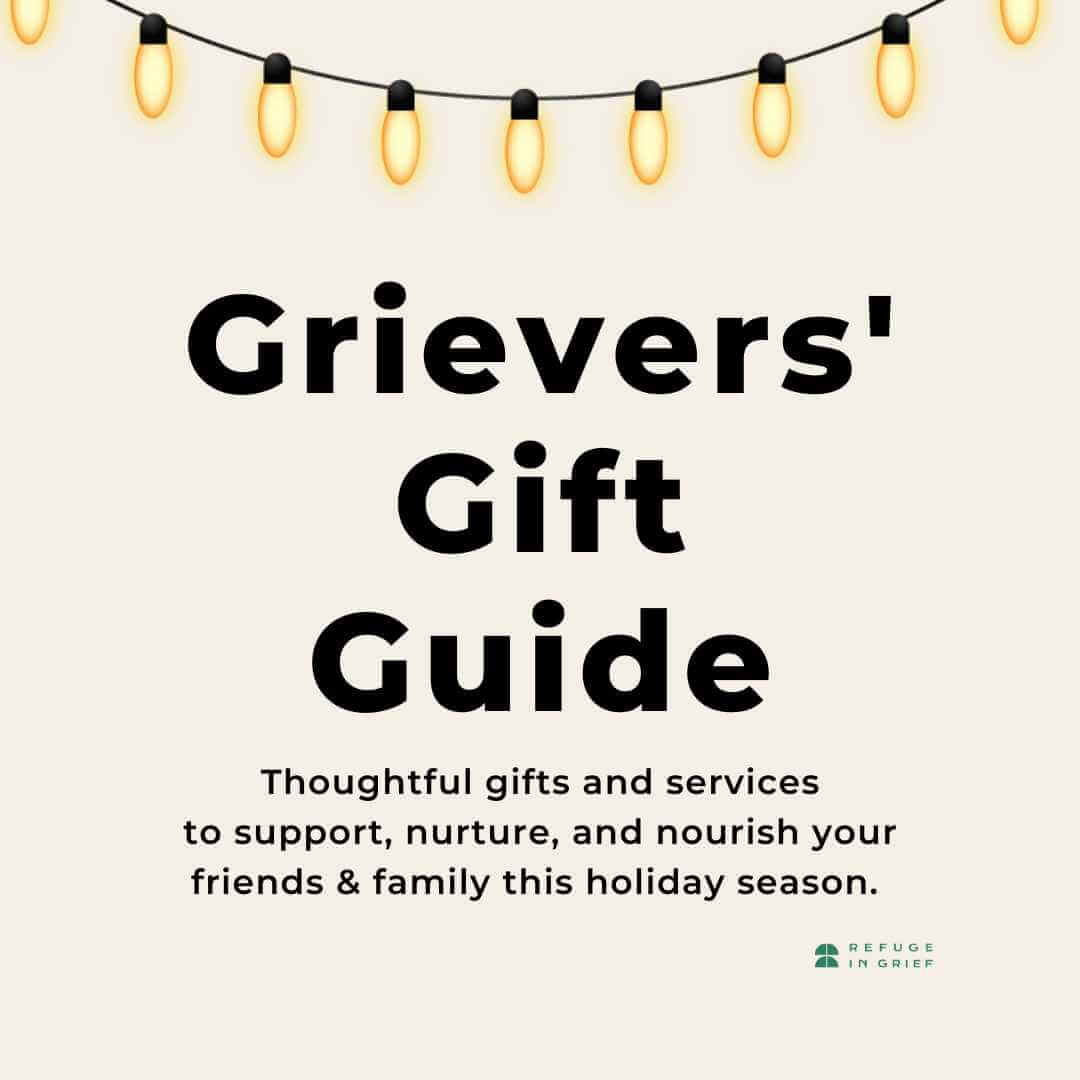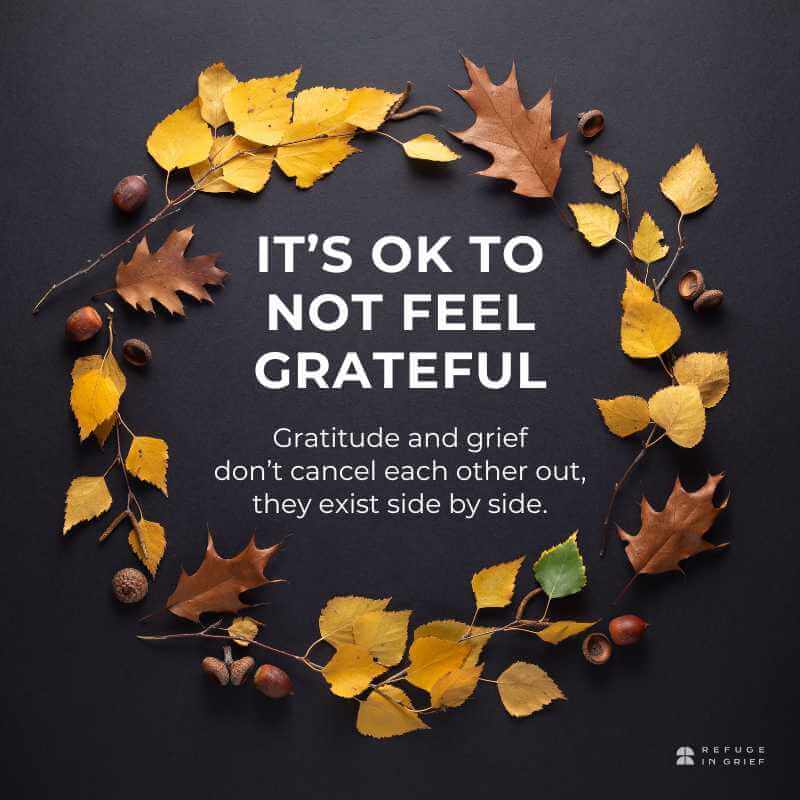How do you help a grieving friend during the holidays? 10 tips to help you help someone you love.
Grief is hard any time of year, but the holidays can feel particularly brutal. Grieving people would love your help and support this holiday season. Here are some ways you might help.
If you’re grieving and you’d like some help educating friends and family on the best ways to support you, this list is for you too:
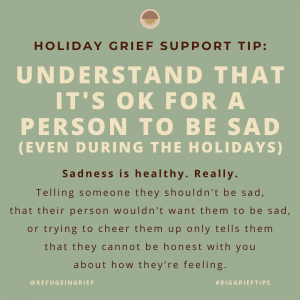 Understand that it’s OK for a person to be sad (even during the holidays). Sadness is healthy. Really. Telling someone they shouldn’t be sad or that their person wouldn’t want them to be sad, or trying to cheer them up only tells them that they cannot be honest with you about how they’re feeling.
Understand that it’s OK for a person to be sad (even during the holidays). Sadness is healthy. Really. Telling someone they shouldn’t be sad or that their person wouldn’t want them to be sad, or trying to cheer them up only tells them that they cannot be honest with you about how they’re feeling.
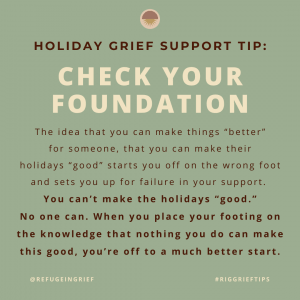 Check your foundation. The idea that you can make things “better” for someone, that you can make their holidays “good,” starts you off on the wrong foot and sets you up for failure in your support. You can’t make the holidays “good.” No one can. When you place your footing on the knowledge that nothing you can do can make things good, you’re off to a much better start.
Check your foundation. The idea that you can make things “better” for someone, that you can make their holidays “good,” starts you off on the wrong foot and sets you up for failure in your support. You can’t make the holidays “good.” No one can. When you place your footing on the knowledge that nothing you can do can make things good, you’re off to a much better start.
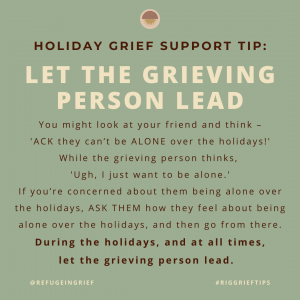 Let the grieving person lead. You might look at your friend and think – ‘ACK, they can’t be ALONE over the holidays!’ While the grieving person thinks, ‘Ugh, I just want to be alone.’ If you’re concerned about them being alone over the holidays, ASK THEM how they feel about being alone over the holidays, and then go from there. During the holidays, and at all times, let the grieving person lead.
Let the grieving person lead. You might look at your friend and think – ‘ACK, they can’t be ALONE over the holidays!’ While the grieving person thinks, ‘Ugh, I just want to be alone.’ If you’re concerned about them being alone over the holidays, ASK THEM how they feel about being alone over the holidays, and then go from there. During the holidays, and at all times, let the grieving person lead.
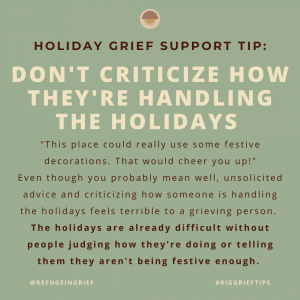 Don’t criticize how they’re handling the holidays. “This place could really use some festive decorations. That would cheer you up!” Even though you probably mean will, unsolicited advice and criticizing how someone is handling the holidays feels terrible to a grieving person. The holidays are already difficult without people judging how they’re doing or telling them they aren’t being festive enough.
Don’t criticize how they’re handling the holidays. “This place could really use some festive decorations. That would cheer you up!” Even though you probably mean will, unsolicited advice and criticizing how someone is handling the holidays feels terrible to a grieving person. The holidays are already difficult without people judging how they’re doing or telling them they aren’t being festive enough.
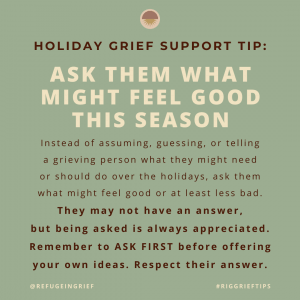 Ask them what might feel good this season. Instead of assuming, guessing, or telling a grieving person what they might need or should do over the holidays, ask them what might feel good or at least less bad.
Ask them what might feel good this season. Instead of assuming, guessing, or telling a grieving person what they might need or should do over the holidays, ask them what might feel good or at least less bad.
They may not have an answer, but being asked it always appreciated. Remember to ASK FIRST before offering your own ideas. Respect their answer.
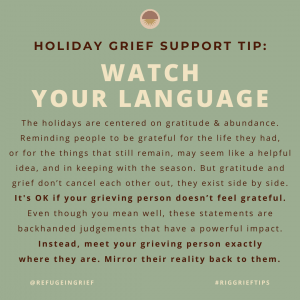 Watch your language. The holidays are centered on gratitude and abundance. Reminding people to be grateful for the life they had, or for things that still remain, may seem like a helpful idea, and in keeping with the season. But gratitude & grief don’t cancel each other out, they exist side by side. It’s OK if your grieving person doesn’t feel grateful. Even though you mean well, these statements are backhanded judgements that have a powerful impact. Instead, meet your grieving person exactly where they are. Mirror their reality back to them.
Watch your language. The holidays are centered on gratitude and abundance. Reminding people to be grateful for the life they had, or for things that still remain, may seem like a helpful idea, and in keeping with the season. But gratitude & grief don’t cancel each other out, they exist side by side. It’s OK if your grieving person doesn’t feel grateful. Even though you mean well, these statements are backhanded judgements that have a powerful impact. Instead, meet your grieving person exactly where they are. Mirror their reality back to them.
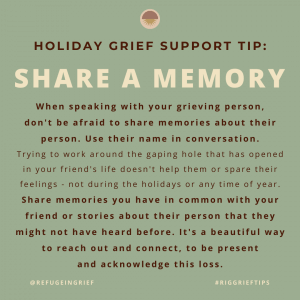 Share a memory. When speaking with your grieving person, don’t be afraid to share memories about their person. Use their name in conversation. Trying to work around the gaping hole that has opened in your friend’s life doesn’t help them or spare their feelings – not during the holidays or any time of year. Share memories you have in common with your friend or stories about their person that they might not have heard before. It’s a beautiful way to reach out and connect, to be present and acknowledge this loss.
Share a memory. When speaking with your grieving person, don’t be afraid to share memories about their person. Use their name in conversation. Trying to work around the gaping hole that has opened in your friend’s life doesn’t help them or spare their feelings – not during the holidays or any time of year. Share memories you have in common with your friend or stories about their person that they might not have heard before. It’s a beautiful way to reach out and connect, to be present and acknowledge this loss.
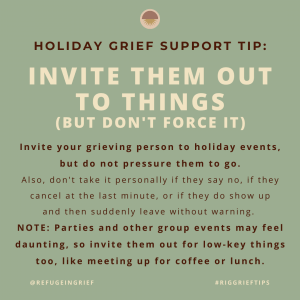 Invite them out to things (but don’t force it). Invite your grieving person to holiday events, but do not pressure them to go. Also, don’t take it personally if they say no, if they cancel at the last minute, or if they do show up and then suddenly leave without warning. NOTE: Parties and other group events may feel daunting, so invited them out for low-key things too, like meeting up for coffee or lunch.
Invite them out to things (but don’t force it). Invite your grieving person to holiday events, but do not pressure them to go. Also, don’t take it personally if they say no, if they cancel at the last minute, or if they do show up and then suddenly leave without warning. NOTE: Parties and other group events may feel daunting, so invited them out for low-key things too, like meeting up for coffee or lunch.
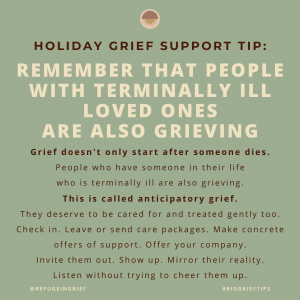 Remember that people with terminally ill loved ones are also grieving. Grief doesn’t only start after someone dies. People who have someone in their life who is terminally ill are also grieving. This is called anticipatory grief. They deserve to be cared for and treated gently too. Check in. Leave or send care packages. Make concrete offers of support. Offer your company. Invite them out. Show up. Mirror their reality. Listen without trying to cheer them up.
Remember that people with terminally ill loved ones are also grieving. Grief doesn’t only start after someone dies. People who have someone in their life who is terminally ill are also grieving. This is called anticipatory grief. They deserve to be cared for and treated gently too. Check in. Leave or send care packages. Make concrete offers of support. Offer your company. Invite them out. Show up. Mirror their reality. Listen without trying to cheer them up.
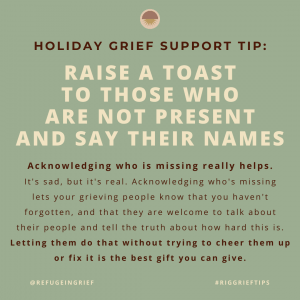 Raise a toast to those who are not present and say their names. Acknowledging who is missing really helps. It’s sad, but it’s real. Acknowledging who’s missing lets your grieving person know that you haven’t forgotten, and that they are welcome to talk about their people and tell the truth about how hard this is. Letting them do that without trying to cheer them up or fix it is the best gift you can give.
Raise a toast to those who are not present and say their names. Acknowledging who is missing really helps. It’s sad, but it’s real. Acknowledging who’s missing lets your grieving person know that you haven’t forgotten, and that they are welcome to talk about their people and tell the truth about how hard this is. Letting them do that without trying to cheer them up or fix it is the best gift you can give.
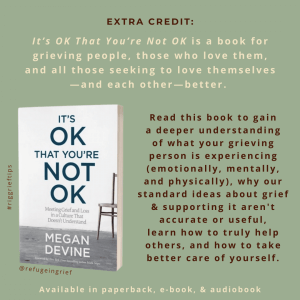 Extra credit: For a deeper understanding of grief and to learn how to truly support people in pain (and take better care of yourself), read my first book, It’s OK That You’re Not OK – available wherever you buy books.
Extra credit: For a deeper understanding of grief and to learn how to truly support people in pain (and take better care of yourself), read my first book, It’s OK That You’re Not OK – available wherever you buy books.
Read this book to gain a deeper understanding of what your grieving person is experiencing (emotionally, mentally, and physically), why our standard ideas about grief and supporting it aren’t accurate or useful, learn how to truly help others, and how to take better care of yourself.
Remember: There is no right or wrong way to do the holiday season. It’s important to reach out & connect. It’s OK to be feel awkward. You don’t need to be perfect, just present.
Looking for gift ideas for your grieving person? We’ve got you. Check out our Grievers’ Gift Guide.
Be sure to share this post, friends. Helping people get better at supporting others requires a community effort. Most people want to help, they just aren’t sure how. By sharing this post (and others from the RIG archives), we help everyone get better at delivering the love and support they intend.
Grief can feel particularly brutal during the holidays. Trying to support someone you love? These tips are for you. Need some help educating friends & family on the best ways to support you? We've got you. Click To Tweet
